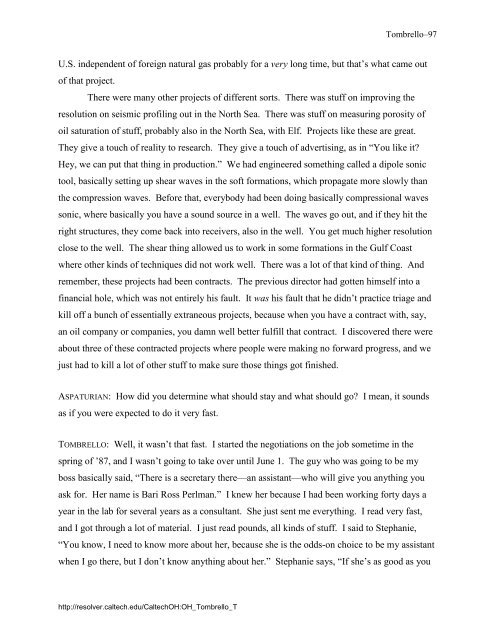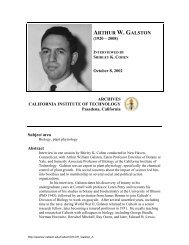Interview with Thomas A. Tombrello - Caltech Oral Histories
Interview with Thomas A. Tombrello - Caltech Oral Histories
Interview with Thomas A. Tombrello - Caltech Oral Histories
Create successful ePaper yourself
Turn your PDF publications into a flip-book with our unique Google optimized e-Paper software.
<strong>Tombrello</strong>–97<br />
U.S. independent of foreign natural gas probably for a very long time, but that’s what came out<br />
of that project.<br />
There were many other projects of different sorts. There was stuff on improving the<br />
resolution on seismic profiling out in the North Sea. There was stuff on measuring porosity of<br />
oil saturation of stuff, probably also in the North Sea, <strong>with</strong> Elf. Projects like these are great.<br />
They give a touch of reality to research. They give a touch of advertising, as in “You like it?<br />
Hey, we can put that thing in production.” We had engineered something called a dipole sonic<br />
tool, basically setting up shear waves in the soft formations, which propagate more slowly than<br />
the compression waves. Before that, everybody had been doing basically compressional waves<br />
sonic, where basically you have a sound source in a well. The waves go out, and if they hit the<br />
right structures, they come back into receivers, also in the well. You get much higher resolution<br />
close to the well. The shear thing allowed us to work in some formations in the Gulf Coast<br />
where other kinds of techniques did not work well. There was a lot of that kind of thing. And<br />
remember, these projects had been contracts. The previous director had gotten himself into a<br />
financial hole, which was not entirely his fault. It was his fault that he didn’t practice triage and<br />
kill off a bunch of essentially extraneous projects, because when you have a contract <strong>with</strong>, say,<br />
an oil company or companies, you damn well better fulfill that contract. I discovered there were<br />
about three of these contracted projects where people were making no forward progress, and we<br />
just had to kill a lot of other stuff to make sure those things got finished.<br />
ASPATURIAN: How did you determine what should stay and what should go? I mean, it sounds<br />
as if you were expected to do it very fast.<br />
TOMBRELLO: Well, it wasn’t that fast. I started the negotiations on the job sometime in the<br />
spring of ’87, and I wasn’t going to take over until June 1. The guy who was going to be my<br />
boss basically said, “There is a secretary there—an assistant—who will give you anything you<br />
ask for. Her name is Bari Ross Perlman.” I knew her because I had been working forty days a<br />
year in the lab for several years as a consultant. She just sent me everything. I read very fast,<br />
and I got through a lot of material. I just read pounds, all kinds of stuff. I said to Stephanie,<br />
“You know, I need to know more about her, because she is the odds-on choice to be my assistant<br />
when I go there, but I don’t know anything about her.” Stephanie says, “If she’s as good as you<br />
http://resolver.caltech.edu/<strong>Caltech</strong>OH:OH_<strong>Tombrello</strong>_T

















